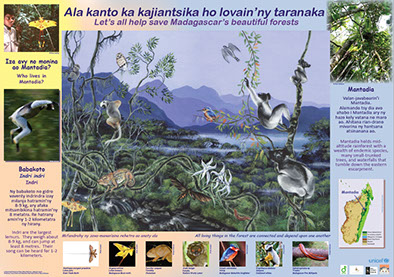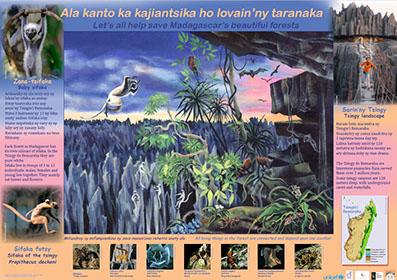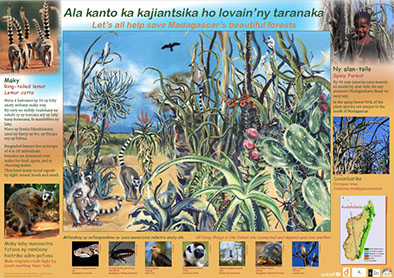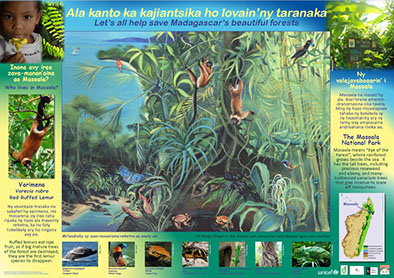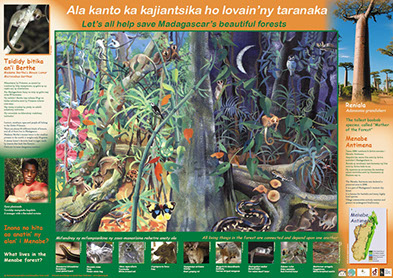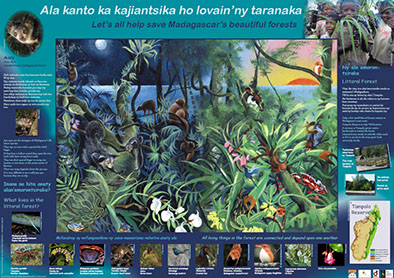
The Ako Project
 Illustrator Deborah Ross and the late primatologist Dr. Alison Jolly collaborated on a vision: a series of bilingual picture books in which story and science converge. In 2005 LCF published the first title, Ny Aiay Ako (Ako the Aye-Aye), translated into Malagasy by Dr. Hantanirina Rasamimanana. LCF and the creators put these books in the hands of teachers in the United States, Madagascar, and around the world.
Illustrator Deborah Ross and the late primatologist Dr. Alison Jolly collaborated on a vision: a series of bilingual picture books in which story and science converge. In 2005 LCF published the first title, Ny Aiay Ako (Ako the Aye-Aye), translated into Malagasy by Dr. Hantanirina Rasamimanana. LCF and the creators put these books in the hands of teachers in the United States, Madagascar, and around the world.
The success of that initiative spawned a six-book series with accompanying posters and teacher materials about different types of lemurs and their fragile habitats in Madagascar. Thanks to funding by Nature’s Path EnviroKidz, the Jolly family, UNICEF, the Liz Claiborne and Art Ortenberg Foundation, the McCrae Conservation and Education Fund, and LCF, the Ako Project has developed into an international environmental education program.
The Ako Books
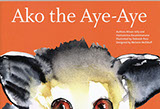 Ako the Aye-Aye ("ako" means "echo") is a little aye-aye who really likes to romp. His species is solitary, so he plays with his food and his mother’s tail. He finds and loses a brown lemur playmate. Finally, he is so busy hanging by his feet that he forgets to be scared of humans. Some Malagasy believe that aye-ayes bring bad luck, but when visitors to the reserve see him playing, they stop being scared too.
Ako the Aye-Aye ("ako" means "echo") is a little aye-aye who really likes to romp. His species is solitary, so he plays with his food and his mother’s tail. He finds and loses a brown lemur playmate. Finally, he is so busy hanging by his feet that he forgets to be scared of humans. Some Malagasy believe that aye-ayes bring bad luck, but when visitors to the reserve see him playing, they stop being scared too.
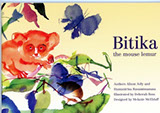 Bitika the Mouse Lemur is a baby lemur of the smallest species in Madagascar. ("Bitika" means "tiny.") She ventures out of the nest and meets all the larger lemur species of the baobab forest: the chorus is “Bitika felt small.” Then she saves her mother’s life from a white-browed owl. She ends up feeling like the biggest lemur in all Madagascar.
Bitika the Mouse Lemur is a baby lemur of the smallest species in Madagascar. ("Bitika" means "tiny.") She ventures out of the nest and meets all the larger lemur species of the baobab forest: the chorus is “Bitika felt small.” Then she saves her mother’s life from a white-browed owl. She ends up feeling like the biggest lemur in all Madagascar.
 Tik-Tik the Ringtailed Lemur is an adolescent male ring-tailed lemur growing up in a species where females are totally dominant and young males must emigrate to new troops. "Tik-tik" means “Let’s go!” in ring-tailed lemur sounds. He leaves his mother’s troop to travel alone through the cactus-like spiny forest. He fights his rival, Longtooth, and wins the beautiful Feather-Fur. Ring-tailed lemur social calls appear in context so children can click, meow, purr, howl, squeak, shout war-cries, give alarm calls, and sing the male sunset song.
Tik-Tik the Ringtailed Lemur is an adolescent male ring-tailed lemur growing up in a species where females are totally dominant and young males must emigrate to new troops. "Tik-tik" means “Let’s go!” in ring-tailed lemur sounds. He leaves his mother’s troop to travel alone through the cactus-like spiny forest. He fights his rival, Longtooth, and wins the beautiful Feather-Fur. Ring-tailed lemur social calls appear in context so children can click, meow, purr, howl, squeak, shout war-cries, give alarm calls, and sing the male sunset song.
 Fuzzy and Furry the Red Ruffed Lemur Twins live on the Masoala Peninsula, where the rainforest goes down to the sea and the trees are so tall that even their mother has never been to the ground. The branch where she parks them breaks in a cyclone. They fall by a forester’s hut. The forester’s wife wants to cook the baby lemurs, but the twin children want them as pets. The wise forester says, “Suppose you were lost and the lemurs wanted to make pets of you!”
Fuzzy and Furry the Red Ruffed Lemur Twins live on the Masoala Peninsula, where the rainforest goes down to the sea and the trees are so tall that even their mother has never been to the ground. The branch where she parks them breaks in a cyclone. They fall by a forester’s hut. The forester’s wife wants to cook the baby lemurs, but the twin children want them as pets. The wise forester says, “Suppose you were lost and the lemurs wanted to make pets of you!”
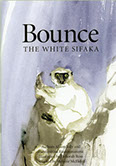 Bounce the White Sifaka is a young sifaka lemur who lives among karst pinnacles, Madagascar’s “stone forest.” He falls down a crevasse, and his family cannot reach him. He is frightened by bats, a snake, carnivorous cockroaches, and a fossa, the largest predator of Madagascar. He finally leaps to safety on his mother’s back.
Bounce the White Sifaka is a young sifaka lemur who lives among karst pinnacles, Madagascar’s “stone forest.” He falls down a crevasse, and his family cannot reach him. He is frightened by bats, a snake, carnivorous cockroaches, and a fossa, the largest predator of Madagascar. He finally leaps to safety on his mother’s back.
 No-Song the Indri lives in highland rainforest. Her family sings beautifully, but she is too young to sing. Everything in the forest makes noises: trees, bees, birds, frogs, even a mosquito. Still, No-Song cannot sing. She finally understands what the indri songs mean during a territorial battle, and she at last finds her own voice.
No-Song the Indri lives in highland rainforest. Her family sings beautifully, but she is too young to sing. Everything in the forest makes noises: trees, bees, birds, frogs, even a mosquito. Still, No-Song cannot sing. She finally understands what the indri songs mean during a territorial battle, and she at last finds her own voice.
Posters
Learn about the environment of each lemur featured in the books. Click below to view or download.
Additional Resources
For more information, or to participate in the Ako Project, contact akoproject@lemurreserve.org.
